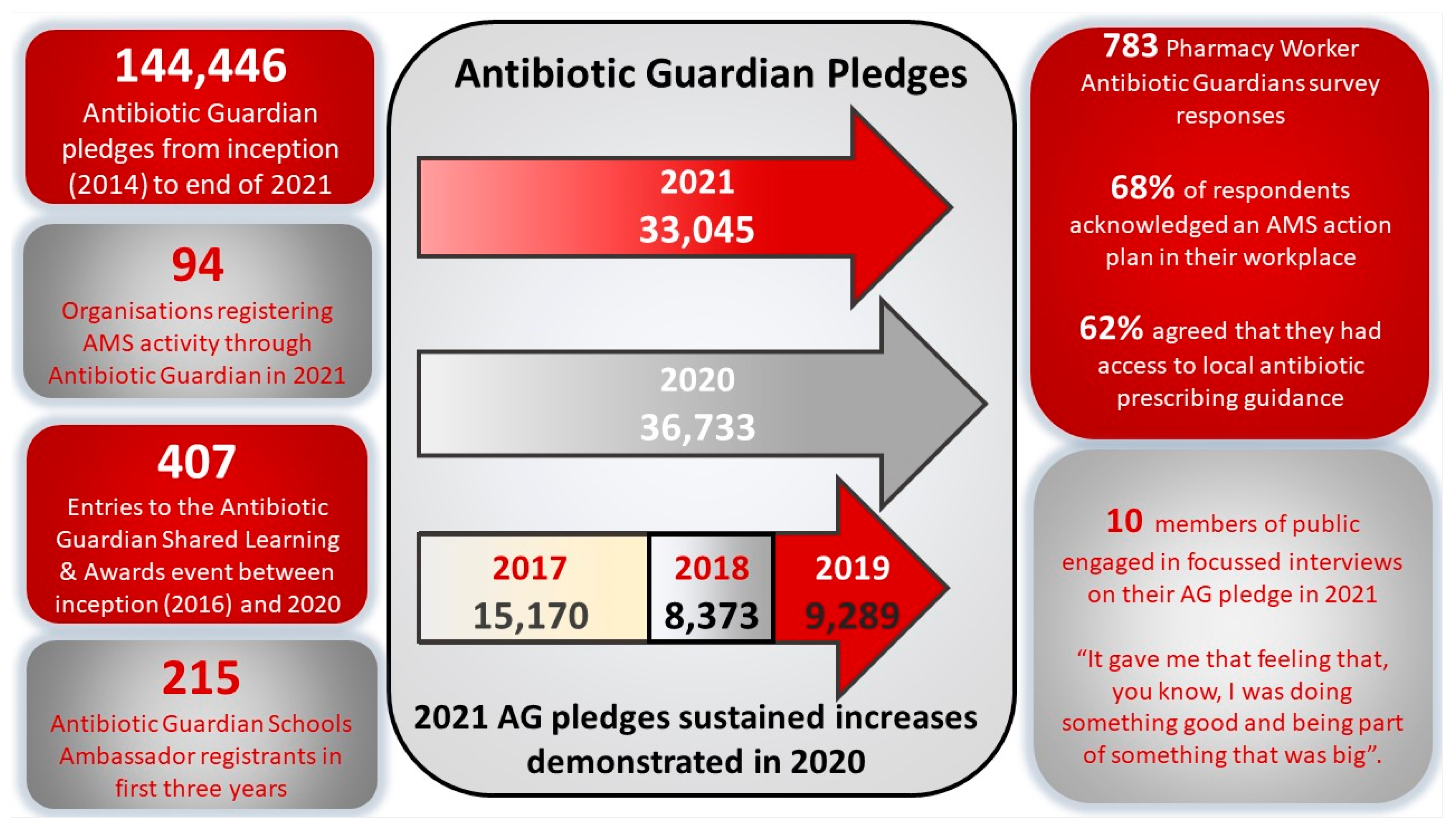Antimicrobial Resistance: Professional and Public Education, Engagement, and Training Activities 2021–2022 (ESPAUR Report) †
Abstract
1. Introduction
2. Healthcare Professional Training
3. Public and Professional Engagement
4. Public Engagement
5. Conclusions
Author Contributions
Funding
Institutional Review Board Statement
Informed Consent Statement
Data Availability Statement
Acknowledgments
Conflicts of Interest
References
- UK 5-Year Action Plan for Antimicrobial Resistance 2019 to 2024; Department of Health and Social Care: London, UK, 2019.
- UK 20-Year Vision for Antimicrobial Resistance; Department of Health and Social Care: London, UK, 2019.
- Ashiru-Oredope, D.; Hopkins, S.; on behalf of the English Surveillance Programme for Antimicrobial Utilization and Resistance Oversight Group. Antimicrobial stewardship: English surveillance programme for antimicrobial utilization and resistance (ESPAUR). J. Antimicrob. Chemother. 2013, 68, 2421–2423. [Google Scholar] [CrossRef] [PubMed]
- Hayes, C.V.; Charlesworth, J.; Ashiru-Oredope, D.; Sides, E.; Jackson, A.; Cooper, E.; Read, B.; Seaton, D.; Flintham, L.; Sidhu, H.; et al. Chapter 6 Professional and public education, engagement, and training. In The English Surveillance Programme for Antimicrobial Utilisation and Resistance (ESPAUR) Report 2021 to 2022; UK Health Security Agency: London, UK, 2022. [Google Scholar]
- Royal College of General Practitioners. TARGET Antibiotics Toolkit Hub. Available online: https://elearning.rcgp.org.uk/course/view.php?id=553 (accessed on 15 August 2022).
- Antibiotic Guardian. Available online: https://antibioticguardian.com (accessed on 19 October 2022).
- Seaton, D.; Ashiru-Oredope, D.; Charlesworth, J.; Gemmell, I.; Harrison, R. Evaluating UK Pharmacy Workers’ Knowledge, Attitudes and Behaviour towards Antimicrobial Stewardship and Assessing the Impact of Training in Community Pharmacy. Pharmacy 2022, 10, 98. [Google Scholar] [CrossRef] [PubMed]
- e-Bug. Available online: https://e-Bug.eu (accessed on 19 October 2022).



Disclaimer/Publisher’s Note: The statements, opinions and data contained in all publications are solely those of the individual author(s) and contributor(s) and not of MDPI and/or the editor(s). MDPI and/or the editor(s) disclaim responsibility for any injury to people or property resulting from any ideas, methods, instructions or products referred to in the content. |
© 2023 by the authors. Licensee MDPI, Basel, Switzerland. This article is an open access article distributed under the terms and conditions of the Creative Commons Attribution (CC BY) license (https://creativecommons.org/licenses/by/4.0/).
Share and Cite
Hayes, C.V.; Charlesworth, J.; Ashiru-Oredope, D.; Sides, E.; Jackson, A.; Cooper, E.; Read, B.; Seaton, D.; Flintham, L.; Sidhu, H.; et al. Antimicrobial Resistance: Professional and Public Education, Engagement, and Training Activities 2021–2022 (ESPAUR Report). Med. Sci. Forum 2022, 15, 19. https://doi.org/10.3390/msf2022015019
Hayes CV, Charlesworth J, Ashiru-Oredope D, Sides E, Jackson A, Cooper E, Read B, Seaton D, Flintham L, Sidhu H, et al. Antimicrobial Resistance: Professional and Public Education, Engagement, and Training Activities 2021–2022 (ESPAUR Report). Medical Sciences Forum. 2022; 15(1):19. https://doi.org/10.3390/msf2022015019
Chicago/Turabian StyleHayes, Catherine V., Jordan Charlesworth, Diane Ashiru-Oredope, Eirwen Sides, Amy Jackson, Emily Cooper, Brieze Read, Donna Seaton, Lorna Flintham, Harpreet Sidhu, and et al. 2022. "Antimicrobial Resistance: Professional and Public Education, Engagement, and Training Activities 2021–2022 (ESPAUR Report)" Medical Sciences Forum 15, no. 1: 19. https://doi.org/10.3390/msf2022015019
APA StyleHayes, C. V., Charlesworth, J., Ashiru-Oredope, D., Sides, E., Jackson, A., Cooper, E., Read, B., Seaton, D., Flintham, L., Sidhu, H., & Lecky, D. M. (2022). Antimicrobial Resistance: Professional and Public Education, Engagement, and Training Activities 2021–2022 (ESPAUR Report). Medical Sciences Forum, 15(1), 19. https://doi.org/10.3390/msf2022015019






